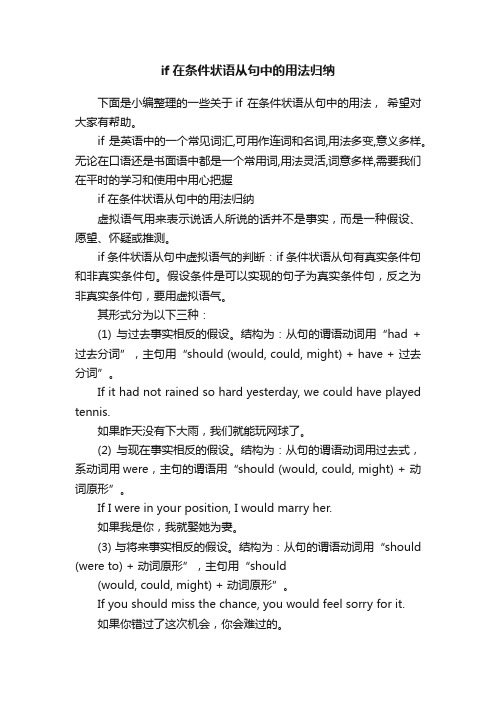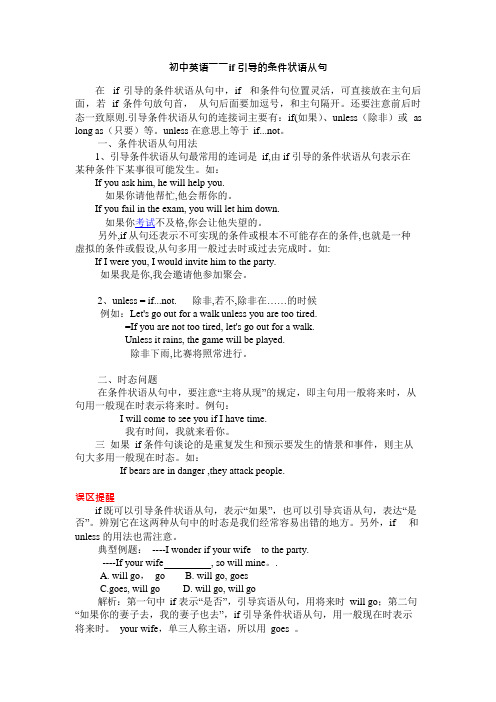If引导条件状语从句的详细用法解答
高三复习-if引导的条件状语从句用法

if引导的条件状语从句用法if引导的状语从句,通常我们可以叫条件状语从句,注意一下它的时态非常自然的一种结构,然后我们读熟一个例句就好了。
If it rains tomorrow,I will not go。
If是一个连词,作为连词后面常常会引导一个句子,这个句子就是状语从句。
例句If it rains tomorrow,I will not go,如果明天下雨我就不会去。
这个条件状语从句叫做主将从现,主语用将来时,从句用一般现在时。
注意:在if的条件状语从句中,主句为下列情形之一时,if条件状语要用一般现在时。
1.主句是一般将来时(主将从现)例如:If he comes, he will tell me all.如果他来了,他会告诉我所有(的事情)。
(这个知识点在初中阶段是常考题,简称“主将从现”——主句是一般将来时态,从句是一般现在时态。
本句中主句是由will引导的一般将来时态的句子,从句是由if引导的一般现在时态的句子,符合主将从现的法则。
)2.主句是含有情态动词may/might/can/must/should等句子。
例如:If you want to lose weight, you must eat less bread.如果你想减肥,你必须少吃面包。
(主句中含有情态动词must,所以if引导的条件状语从句要用一般现在时态。
)3.主句是祈使句例如:If you are not strong enough, please dont take part in such an activity.如果你不够强壮,请不要参加这种活动。
(主句是一个Do型的祈使句,所以根据原则,if从句要用一般现在时态。
)。
if状语从句的用法

if状语从句的用法1. if 引导的条件状语从句(真实条件句)用在if引导的条件状语从句中,表示在某种条件下很可能发生时,就是真实条件句,通常从句用一般现在时,主句用将来时态或者情态动词+动词原形或者祈使句的形式。
1 if从句用一般现在时,主句用一般将来时例If he runs he’ll get there in time. 如果他跑的话,他就会及时赶到那儿。
The cat will scratch you if you pull its tail. 如果你拉这只猫的尾巴,它就会抓你。
2 if从句用一般现在时,主句用may/might/can+动词原形例If the fog gets thicker the plane may/might be diverted. 如果雾再大一些,飞机可能就会改在别的机场降落。
If it stops snowing we can go out. 如果雪停了,我们就可以出去。
3 if从句用一般现在时,主句用must/should+动词原形例If you want to lose weight you must/should eat less bread. 如果你想减肥,就必须/应该少吃面包。
4 if从句用一般现在时,主句用一般现在时例If you heat ice it turns to water.(也可用will turn)如果你给冰加热,它就会化成水。
5 if从句用现在进行时,主句用一般将来时例If you are looking for Peter you’ll find him upstairs. 如果你是在找彼得,上楼就会找到他。
6 if从句用现在完成时,主句用一般将来时例If you have finished dinner I’ll ask the waiter for the bill. 如果你吃完了,我就叫服务生来结账。
2. If引导的条件状语从句(虚拟条件句)用表示的内容与现在事实相反,if从句用一般过去时,主句用“would/should/could/might+动词原形”;表示与过去事实相反,if从句用had+动词的过去分词,主句用would/should/could/might+have+动词的过去分词;表示对将来情况的主观推测,if从句用①should+动词原形②were to+动词原形,主句用would/should/could/might+动词原形。
if在条件状语从句中的用法归纳

if在条件状语从句中的用法归纳下面是小编整理的一些关于if 在条件状语从句中的用法,希望对大家有帮助。
if是英语中的一个常见词汇,可用作连词和名词,用法多变,意义多样。
无论在口语还是书面语中都是一个常用词,用法灵活,词意多样,需要我们在平时的学习和使用中用心把握if 在条件状语从句中的用法归纳虚拟语气用来表示说话人所说的话并不是事实,而是一种假设、愿望、怀疑或推测。
if 条件状语从句中虚拟语气的判断:if 条件状语从句有真实条件句和非真实条件句。
假设条件是可以实现的句子为真实条件句,反之为非真实条件句,要用虚拟语气。
其形式分为以下三种:(1) 与过去事实相反的假设。
结构为:从句的谓语动词用“had + 过去分词”,主句用“should (would, could, might) + have + 过去分词”。
If it had not rained so hard yesterday, we could have played tennis.如果昨天没有下大雨,我们就能玩网球了。
(2) 与现在事实相反的假设。
结构为:从句的谓语动词用过去式,系动词用were,主句的谓语用“should (would, could, might) + 动词原形”。
If I were in your position, I would marry her.如果我是你,我就娶她为妻。
(3) 与将来事实相反的假设。
结构为:从句的谓语动词用“should (were to) + 动词原形”,主句用“shou ld(would, could, might) + 动词原形”。
If you should miss the chance, you would feel sorry for it.如果你错过了这次机会,你会难过的。
If引导的条件状语从句知识讲解

2. 借助介词with 或without来转换。
例如: If you help me, I’ll finish my job soon.
W--i-t-h--y--o-u--r--h--e-l-p-, I’ll finish my job soon. 如果你帮我,我将很快完成我的工作。 If there is no water, fish may die.
• 2. 在if引导的条件状语从句中不能够使用some, 而要用any。
• 例如: If you have any questions to ask, please come to my office. 如果你有问题要问的 话,请到我办公室来。
1. if 在句中的含义不同 I want to know if he is a teacher.
3 If she ___d_o_e_s_n_’t_g_e_t____(not get ) up early , she’ll miss the early bus .
3. 时态要求上有区别
1.I want to know if there will be
a
sports meeting next month.
If 引导的宾语从句的时态由主句及本身时
态决定;
2.If it doesn’t rain , we’ll hold it.
If 引导条件状语从句的时态为一般现在时 记住“主将从现”
I won’t go there _____ I _____hear from you. I won’t go to the party if I am not invited. (同义句)
if条件状语从句的用法_If引导的条件状语从句

if条件状语从句的用法_If引导的条件状语从句很多英语学习者都觉得If引导的条件状语从句这个句型很难,学习起来很吃力。
下面是小编为你整理的If引导的条件状语从句的相关资料,希望大家喜欢!If引导的条件状语从句用法1.if引导的条件状语从句可以放在主句之前,也可以放在主句之后,如果放在主句之前,中间要用逗号将主句和从句隔开。
例如:If I am free, I will come to see you.= I will come to see you if I am free.如果我有空,我就来看你。
2. 在含if引导的条件状语从句的复合句中,主句用一般将来时,从句通常用一般现在时态表示将来意义,即主将从现原则。
例如:If it snows tomorrow, we will go skiing.如果明天下雪,我们就去滑雪。
3. 在含if引导的条件状语从句的复合句中,语句的谓语还可含有情态动词can、must、may等,主句也可是祈使句。
例如:If it stops raining, we can go out.如果雨停了,我们就能出去。
4. 在含if引导的条件状语从句的复合句中,如果主句部分描述的是客观事实或真理,要用一般现在时。
例如:If you heat the ice, it turns into water.如果你加热冰,它就会变成水。
if引导的非真实条件句对过去的虚拟条件从句(if):主语+had done 主句might/would/should/could+have done 对现在的虚拟if+ 主语+动词过去式(be用were)主句might/would/should/could+do对将来的虚拟if+主语+动词过去式(be用were)或主语+should do或主语+were to do主句might/would/should/could+doe.g.Tom got to the station in time because he started earlier.If Tom had started late, he would have missed the train.Do you think the thief entered through the door?No, if he had, I don't believe, he would have broken the living room window.If the book weren't so expensive, I would buy it.If you didn't live so far away, we would be able to visit you more.What would you do if you lost your passport in a foreign country?Why hasn't he come? If he should not come on time, we would have to put off the trip.2.注意事项e.g.If she hadn't work hard at English in the past, she wouldn't work as well as a secretary in a large company now. 混合时间的虚拟语气从句为对过去的虚拟,主句是现在。
初中英语If引导的条件状语从句(可编辑修改word版)

初中英语――if 引导的条件状语从句在if 引导的条件状语从句中,if 和条件句位置灵活,可直接放在主句后面,若if 条件句放句首,从句后面要加逗号,和主句隔开。
还要注意前后时态一致原则.引导条件状语从句的连接词主要有:if(如果)、unless(除非)或as long as(只要)等。
unless 在意思上等于if...not。
一、条件状语从句用法1、引导条件状语从句最常用的连词是if,由if 引导的条件状语从句表示在某种条件下某事很可能发生。
如:If you ask him, he will help you.如果你请他帮忙,他会帮你的。
If you fail in the exam, you will let him down.如果你考试不及格,你会让他失望的。
另外,if 从句还表示不可实现的条件或根本不可能存在的条件,也就是一种虚拟的条件或假设,从句多用一般过去时或过去完成时。
如:If I were you, I would invite him to the party.如果我是你,我会邀请他参加聚会。
2、unless = if...not. 除非,若不,除非在……的时候例如:Let's go out for a walk unless you are too tired.=If you are not too tired, let's go out for a walk.Unless it rains, the game will be played.除非下雨,比赛将照常进行。
二、时态问题在条件状语从句中,要注意“主将从现”的规定,即主句用一般将来时,从句用一般现在时表示将来时。
例句:I will come to see you if I have time.我有时间,我就来看你。
三如果if 条件句谈论的是重复发生和预示要发生的情景和事件,则主从句大多用一般现在时态。
if和unless的用法区别条件状语从句
if和unless的用法区别条件状语从句一、if的用法(一)基本用法1. if在条件状语从句中表示“如果”,引导的从句可以放在主句之前或之后。
如果从句在主句之前,从句和主句之间要用逗号隔开。
例如: - If I study hard, I will get good grades.(如果我努力学习,我就会取得好成绩。
)- I will go to the park if it is sunny tomorrow.(如果明天天气晴朗,我就去公园。
)2. 在if引导的条件状语从句中,从句要用一般现在时表示将来,而主句可以用一般将来时(will+动词原形)或者情态动词(如can, may, must 等)+动词原形等形式。
例如:- If he has time, he cane to my party.(如果他有时间,他能来参加我的派对。
)- If you see her, tell her I miss her.(如果你见到她,告诉她我想她。
)(二)固定搭配1. if only,意思是“要是……就好了”,表达一种强烈的愿望,后面的句子要用虚拟语气。
例如:- If only I were taller.(要是我再高一点就好了。
)- If only she coulde to the concert with me.(要是她能和我一起去音乐会就好了。
)2. even if,意思是“即使,虽然”,表示让步关系。
例如:- I will go for a walk even if it rains.(即使下雨我也要去散步。
)- Even if he doesn't like me, I still want to be his friend.(即使他不喜欢我,我仍然想成为他的朋友。
)(三)双语例句1. If you love someone, should you tell them?(如果你爱一个人,你应该告诉他们吗?)2. If we don't protect the environment, where will we live in the future?(如果我们不保护环境,我们将来住在哪里呢?)3. If the cat gets out of the house, it might get lost.(如果猫跑出房子,它可能会迷路。
if引导的条件状语从句(讲义及解析)
if引导的条件状语从句(讲义及解析)状语用来表示行为发生的时刻、地点、目的、方式、程度等,通常由副词或介词短语充当,也可由一个句子充当。
I slept at home yesterday because I had a bad cold.状语从句状语从句指句子作状语。
依照其作用可分为时刻、地点、缘故、条件、目的、结果、让步、方式等从句。
状语从句一样由连词(从属连词)引导。
I will go to school by bike tomorrow if it is sunny.Grammar focus—I think I’ll take the bus to the party.—If you do, you’ll be late.If you take the bus to the party, you’ll be late.—I think I’ll stay at home.—If you do, you’ll be sorry.If you stay at home, you’ll be sorry.—What will happen if they have the party today?—If they have it today, half the class won’t come.—Should we ask people to bring food?—If we ask people to bring food, they’ll just bring potato chips and chocol ate.if 在本单元句中意为“;”,用于引导即 if 引导的是一个完整的句子,因此一定要有主谓,成为从句,另一个句子则成为主句。
If you go there, I’ll go, too.We will go hiking if it doesn’t rain tomorrow.If Bob leaves tomorrow, I will hold a party for him tonight.if 引导的条件状语从句既能够放在主句前,也可放在主句后。
总结好的:if引导的条件状语从句
总结好的:if引导的条件状语从句if引导的条件状语从句if1) ⽤法:(1)条件状语从句通常由连词if引导,意为“如果、假如”,主句不能⽤be going to表⽰将来,⽽应该⽤shall,will。
If you leave now, you are never going to regret it. (错误)If you leave now, you will never regret it. (正确)(2)if “如果”,引导条件状语从句,主句⽤⼀般将来时,从句则⽤⼀般现在时,如:If it rains tomorrow, I shan’t climb the hills.(3)另外,主句是祈使句或含有情态动词,从句也⽤⼀般现在时。
如:Please call me if he comes next Sunday.Can you call the policeman if you are in the trouble.注意宾语从句中的if与条件状语从句if的区别。
宾语从句中的if“是否”相当于whether,引导宾语从句,时态需根据语境确定。
如果主句⽤⼀般现在时,从句可以根据具体情况选⽤时态,如果主句⽤⼀般过去时,从句必须⽤过去式的某种形式。
I don't know if it will rain tomorrow. 我不知道明天是否会下⾬。
Our teacher said there was going to be a football match the next month.我们说下⽉将有场⾜球⽐赛。
【边学边做】⽤括号内所给词的正确形式填空。
1. What will you buy if you ________(have)a lot of money?2. If it ________(not snow)tomorrow, we will feel unhappy.3. You mustn’t go to school if you ________(be)still in bed.4. If he _______(be)at home at that time, he would know it.5. Please show me the way if you ________(know)it.6. You will hurt your teeth if you ________(eat)too much candy.7. If you gave me a toy car, I _________(be)very happy.8. I would get the prize if I _________(work)hard.9.If she ______ (finish ) work early ,she ______(go) home.10.If the weather______(be)fine,we_______(go)for a walk .11. If I_____(have) time tonight ,I _______(finish) the book I’m reading.12. If it ______(rain) next weekend , we_______(not be able to ) plant the vegetable .13. If it_______(rain),we______(stay) at home .14.If she______(arrive) ,she _____(phone) me .15. If he_____(call),tell him I’ll ring back .⼆、⽤所给词的适当形式填空1. If you ________(feel) tired, you _________ (have) to have a rest.2. Where _____ he ____(see) the film if he _________(have) time?3. If there ____ (be) fewer trees, there _______ (be) more pollution.4. He ___ (dress) more casually if he ___ (not work) on weekends.5. If Marcia _______ (live) alone, she _______ (keep) a pet parrot.6. Lana _____ (buy) a new dress if the old one ____ (be) out of style.7. The twins _______ (fight) if they__________ (argue).8. I ______ (have) a bake sale if I ____ (need) money for education.9. Peter ____ (send) me a beautiful souvenir if he ____(tour) Spain.10. If Mr. Green _______ (say) I am hard- working, my parents ___ (feel) glad.11. I ______ (go) to the beach if it________ (not rain) this week.12. _____they ___ (have) a match if the P.E. teacher __ (be) busy?13. He ____ (write) a letter to his grandparents if he ____ (get) his report card this week.14. If she ______ (get) up late, she _____ (not catch) the early bus.15. Peter ____ (major) in English if he ____(pass) the exams in Peking University.⼆、完成句⼦1. 他如果看电视太久了,他的⽗母会不⾼兴。
if引导的条件状语从句的用法
考点剖析条件状语从句是同学们经常接触到的句型。
其中,由if 引导的条件状语从句出现的频率较多。
同学们在学习if 引导的条件状语从句时,可以从位置、时态以及同义句转化三个方面入手。
文章将结合具体实例进行分析,希望能够帮助大家轻松应对这一句型。
一、if 引导的条件状语从句的位置首先,我们要了解这一从句的位置是怎样的。
if 引导的条件状语从句既可以位于主句之前,也可以放在主句之后。
假如从句放在前面,那么从句与主句之间就用逗号分隔。
结构1:“主句+if 引导的条件状语从句”。
例如:I will go to a movie with you if I ’m free this after-noon.如果我下午有空,我将和你一起去看电影。
结构2:“if 引导的条件状语从句+主句”。
例如:If I ’m very busy this Friday ,I won ’t have dinner with you.如果我本周五很忙,我不会跟你共进晚餐。
二、if 引导的条件状语从句的时态if 引导的条件状语从句,主、从句时态是相互呼应的。
一般会有以下几种情况:1.如果主句是一般现在时,那么从句也应该是一般现在时。
一般现在时包括含有情态动词must ,may ,can 等的句子。
例如:You must apologize to me if you break an appoint-ment.如果你失约了,你必须跟我道歉。
If you want to go out and play ,you have to get Mom ’s permission.如果你想出去玩,你就必须得到妈妈的同意。
2.如果主句是一般将来时,从句必须用一般现在时。
例如:If you apologize to him ,he will be very moved.如果你跟他道歉,他会很感动的。
If you get up late ,you will miss the bus.如果你起晚了,你就赶不上公交车了。
- 1、下载文档前请自行甄别文档内容的完整性,平台不提供额外的编辑、内容补充、找答案等附加服务。
- 2、"仅部分预览"的文档,不可在线预览部分如存在完整性等问题,可反馈申请退款(可完整预览的文档不适用该条件!)。
- 3、如文档侵犯您的权益,请联系客服反馈,我们会尽快为您处理(人工客服工作时间:9:00-18:30)。
I f引导条件状语从句的
详细用法解答
文件排版存档编号:[UYTR-OUPT28-KBNTL98-UYNN208]
I f引导条件状语从句的详细用法解答引导条件状语从句最常用的连词是if,常见的if条件状语从句表示在某条件下,某事很可能发生,条件是可能存在的,主句中某种情况发生的概率也是很高的。
如:
If you ask him,he will help you.如果你请他帮忙,他会帮你的。
If you fail in the exam,you will let him down.如果你考试不及格,你会让他失望的。
If you have finished the homework, you can go home.如果你作业做完了就可以回家了。
另外,if从句还表示不可实现的条件或根本不可能存在的条件,也就是一种虚拟的条件或假设。
从句多用一般过去时或过去完成时,表示对现在或过去的一种假设。
如:
If I were you,I would invite him to the party.如果我是你,我会邀请他参加聚会。
I would have arrived much earlier if I had not been caught in the traffic.要不是交通堵塞,我本会来得早一些。
另外你还要注意if 条件句的时态搭配
1.if从句用一般现在时,主句用一般将来时
If he runs he’ll get there in time. 如果他用跑的,他就会及时赶到那儿。
The cat will scratch you if you pull her tail. 如果你拉猫的尾巴,它就会抓你。
2.if从句用一般现在时,主句用may/might/can
If the fog gets thicker the plane may/might be diverted. 如果雾在大一些,飞机可能就会改在别的机场降落。
If it stops snowing we can go out. 如果雪停了,我们就可以出去。
3.if从句用一般现在时,主句用must/should
If you want to lose weight you must/should eat less bread. 如果你想减肥,你必须少吃面包。
4.if从句用一般现在时,主句用一般现在时
If you heat ice it turns to water. (也可用will turn)如果把冰加热,它就会化成水。
5.if从句用现在进行时,主句用一般将来时
If you are looking for Peter you’ll find him upstairs. 如果你是在找彼得,上楼就会找到他。
6.if从句用现在完成时,主句用一般将来时
If you have finished dinner I’ll ask the waiter for the bill. 如果你吃完了,我就叫服务生来算账
注意:
学习" if " 引导的条件状语从句的用法,现在总结一下:
if 条件句不一般,几个要点记心间;
条件句,放在前,逗号要放句中间。
条件句表可能,主句多用将来时;
条件句表事实,主句常用现在时。
在 if 引导的条件状语从句中,如果从句谈论的是一个有可能发生的事实及其产生的相关的结果,主句用一般将来时态,从句用一般现在时态。
如:
We can walk there if we can't find a bus .
If it rains tomorrow ,we will not go to the zoo.
What will you do if you find a panda in danger.
如果 if 条件句谈论的是重复发生和预示要发生的情景和事件,则主从句大多用一般现在时态。
如:
If bears are in danger ,they attack people.
在 if 引导的条件状语从句中,if 和条件句位置灵活,可直接放在主句后面,若if 条件句放句首,从句后面要加逗号,和主句隔开。
还要注意前后时态一致原则。
